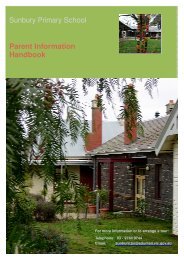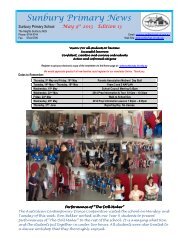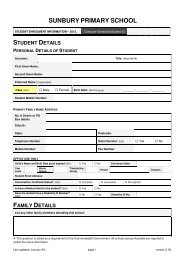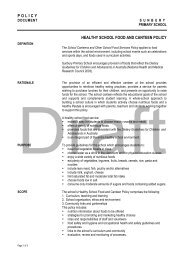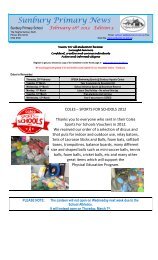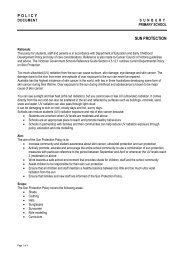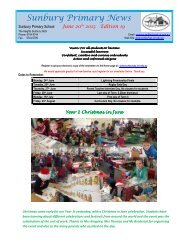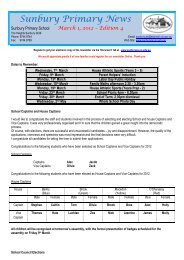Sunbury Primary School Parent Information Handbook
Sunbury Primary School Parent Information Handbook
Sunbury Primary School Parent Information Handbook
- No tags were found...
Create successful ePaper yourself
Turn your PDF publications into a flip-book with our unique Google optimized e-Paper software.
<strong>Sunbury</strong> <strong>Primary</strong> <strong>School</strong><strong>Parent</strong> <strong>Information</strong><strong>Handbook</strong>For more information or to arrange a tour:Telephone: 03 - 9744 9744Email: sunbury.ps@edumail.vic.gov.au
TABLE OF CONTENTSIntroduction 2<strong>Sunbury</strong> <strong>Primary</strong> <strong>School</strong> Map 4Getting Involved 5Student Learning 7Enrolling In <strong>Primary</strong> <strong>School</strong> 10A to Z of <strong>Sunbury</strong> <strong>Primary</strong> <strong>School</strong> 11Appendix 1 20Appendix 2 23Acronyms251
Introduction<strong>Sunbury</strong> <strong>Primary</strong> <strong>School</strong> is located on JacksonsHill on the southern boundary of the townshipo f S u n b u r y, l o c a t e d a p p r o x i m a t e l y 3 5kilometres north-west of Melbourne, within theHume City Council. The school was the firstone to be established in the area and can traceits origins back to 1869 and was relocated to itspresent site in 1999, occupying heritage listedbuildings. The school is an active member ofthe Hume Network and has developed a robustlearning partnership with Victoria University.The school is organised to focus on learningand to provide low class sizes across the school. Specialist programs operate to support schoolpriorities and to take advantage of the teaching capital available to the school.The heritage-listed bluestone buildings provide a quality-learning environment, a unique blend ofhistory while providing modern facilities. <strong>School</strong> facilities include seventeen permanentclassrooms, visual arts and performing arts building, library and school hall. <strong>School</strong> grounds arelandscaped and feature historically significant specimen trees and a horticulture centre. Playevents include a sports oval, basketball court, tennis courts and playground equipment matchedto the different physical and social stages of development together with designated passiverecreation areas and playground seating<strong>Sunbury</strong> <strong>Primary</strong> is proud to be a school driven by strong values and the belief that every studentcan learn. The school strives to develop an engaging, student-centred approach to life-longlearning where student’s academic, social and emotional needs are met. A dynamic learningenvironment, explicit teaching of personal and interpersonal skills for learning ‘how to learn’, andpositive teacher/student relationships ensure student connectedness to school for optimallearning.Key ContactsPrincipal:Assistant Principal:Administrative StaffSean LawlessLoren PeaveyHeather SinclairKaren WalkerTelephone; 03 9744 9744Facsimile: 03 9744 9799E-mail:sunbury.ps@edumail.vic.gov.au<strong>School</strong> VisionFor all students to become:Successful learnersConfident, creative and curious individualsActive and informed citizens2
Term dates for 2014Term 1: January 30 to April 4Please Note:Prep students attend from 9am to 1pm on Thursday January 30 and Friday January 31.Prep students attend full day excepting Wednesdays from February 3 to March 7, then every day.Term 2: April 22 to June 27Term 3: July 14 to September 19Term 4: October 6 to December 19<strong>School</strong> TimesPreparation for the school day begins with a good sleep the night before. Younger children(Prep – Year 2) should be in bed by 7.30pm. Older children should be in bed by 8.30pm.What children experience just before bedtime is also very important in relation to a goodnight’s sleep.Children are expected to be at school in time to commence their classes at 9.00am sharp.The playground is supervised from 8.45am. <strong>Parent</strong>s should drop their children off between8.45am and 8.55am.It is extremely important that punctual habits be established from the beginning of a child’sschooling as this forms part of the routine necessary for a successful school life.<strong>School</strong> Hours:Session 19am – 11amRecess11am - 11.30amSession 211.30am – 1.40pmLunch1.40pm – 2.30pmSession 32.30pm – 3.30pmPlease note that the school grounds are supervised by teachers before school, from 8.45 a.m.to 9.00 a.m. then during recess and lunch and from 3.30 p.m. to 3.45 p.m.Lunches are eaten in class between 1.30pm and 1.40pm.Early dismissal time is 2.30 p.m. on the last day of terms 1, 2 & 3 and is 1.30 p.m. at theend of term 4.Following staff consultation the meeting times for staff meetings are published in theschool newsletter. Usually these meetings are held on Tuesdays and Wednesdaysafter school. <strong>Parent</strong>s are requested to make appointments with teachers around suchtimes.Term dates are published in the school newsletter and on line atwww.education.vic.gov.au/about/keydates/termdates.htm<strong>School</strong> WebsiteThe school web-site can be accessed at www.sunburyps.vic.edu.au3
<strong>Sunbury</strong> <strong>Primary</strong> <strong>School</strong> MapThe main entrance to the school is situated in The Heights. A public car park at the northern end ofthe school accessible via Circular Drive provides a convenient entry to the Prep to Year 2classrooms.All gates to the rear of the school are locked during the day.The pedestrian gate at the rear of the school is locked after 9.30am and reopened in the afternoonto allow access to the site for pick-up and entry for school events such as assembly.<strong>Parent</strong>s are advised to check newsletters and notices to access information for special schoolactivities and events.THE HEIGHTSSTAFFCARPARKMAINENTRANCEB1B2BUILDING BB3OVALGENOFFPRINOFFSTAFFROOMBUILDING ABUILDING CC 1 C 2 C 3BATHHOUSECROSSBUILDINGD1BUILDING DD 2LIBRARYD4BUILDING HHALLSculptureGardenBUILDING EE 1 E 2 E 3BASKETBALLNETBALLCOURTBUILDING GARTSG1BUILDING FNORTHERNENTRANCEF1F 2 F 3SHEDCIRCULAR DRIVE4
Getting InvolvedAssembly<strong>School</strong> assembly is conducted in the school hall each Friday morning commencing at 9.05am.All parents, relatives and friends are invited to attend these assemblies and celebrate thelearning achievements of students. Pupil of the Week Awards, Playground Raffle andTerrific Kids awards are conferred during school assembly.Assistance<strong>Parent</strong>s are encouraged to be active partners in the educative processes andopportunities provided to students.All questions and wonderings about your child should be directed to the classroom teacherby making an appointment and nominating the purpose of the meeting.The Principal and Assistant Principals are available to discuss all matters relating to the schooland appointments can be made via the general office by telephone, fax, e-mail or in person.Classroom helpers<strong>Parent</strong>s are welcome to assist in classroom programs under the supervision of the classteachers. A training session is conducted for parents wishing to assist each year to facilitatemaximum benefit from the experience.CanteenThe canteen is currently open on Monday, Tuesday, Wednesday and Friday and supportshealthy food choices. Our canteen co-ordinator organises the roster for volunteer parents.Price lists and menus for the canteen are distributed to all families at the beginning of theyear and available from the school’s web-site. Lunch orders are to be written on brown paperbags listing the following information: child’s name, room and class, the selected food itemsand their costs and the total of the lunch order. The correct money should be securely placedwithin the lunch order bag.<strong>Parent</strong> volunteers are invited to join the canteen roster each year via a notice in theschool newsletter.<strong>Information</strong> Evenings<strong>Information</strong> evenings are conducted mid February for all parents to enhance the homeschoollearning partnership.Specific Prep information evenings are conducted in term two and four, with Prep and Year 6transition and orientation activities held in December. See local newspapers and schoolnewsletter for dates and times.NewsletterThe newsletter is produced weekly and can be downloaded from the school’s web-site. Aweekly bulletin highlighting important information in the newsletter is distributed to eachstudent on a Thursday afternoon. The newsletter is the most up to date source of informationabout the events occurring at <strong>Sunbury</strong> <strong>Primary</strong> <strong>School</strong>.Make it your “must read” each week.5
<strong>Parent</strong>s AssociationThe <strong>Parent</strong>s Association meets regularly. All meetings are advertised in the school newsletter.All parents and friends are welcome and may become financial/voting members for a nominalcost per year.The Annual General Meeting is held in March. All meetings are advertised in the schoolnewsletter. Through various social and fund-raising activities, the <strong>Parent</strong>s Association is ableto provide, via the <strong>School</strong> Council, much needed equipment and materials for the school, foryour child’s benefit.The work of the <strong>Parent</strong>s Association is extremely important and we welcome all new parentsto our school and invite your participation. A <strong>Parent</strong>s Association newsletter is forwarded tofamilies once per term.<strong>Parent</strong> Complaints / IssuesA school policy exists to describe the process for managing parent complaints and issues.This policy is available from the general office and an overview can be found at the school’swebsite. More information can be obtained from:http://www.education.vic.gov.au/about/contact/ pcschools.htm<strong>School</strong> CouncilThe <strong>School</strong> Council schedule consists of nine positions:5 <strong>Parent</strong> members3 Department membersMeetings are held at the school twice each term on Wednesday evenings and parents arewelcome to attend to observe meetings.The <strong>School</strong> Council plays an important role, ensuring the best possible outcomes for allstudents at <strong>Sunbury</strong> <strong>Primary</strong> <strong>School</strong>.An Annual Reporting Meeting is conducted each year to coincide with the publishing of theschool’s Annual Report. The schedule for this meeting along with all meeting times ispublished in the school newsletter.Student Engagement PolicyThis policy was developed by all Government schools in 2009. The new policy reflects theimportance of regular attendance, the revised discipline procedures and the role that parentsare to play to assist schools. For more information:http://www.education.vic.gov.au/healthwellbeing/ wellbeing/engagement/default.htm6
Student LearningAnnual Implementation PlanAnnual implementation planning assists schools to:o plan and communicate their work for the coming year and how this will lead to achieving thegoals and targets in the school strategic plan;o ensure efficient and effective allocation of resources to complete the work;o monitor progress and success.The Annual Implementation plan must be endorsed by the school principal, the schoolcouncil and the regional director (or nominee).Curriculum – National (also known as AusVels)AusVELS is the Foundation to Year 10 curriculum that provides a single, coherent andcomprehensive set of prescribed content and common achievement standards, whichschools use to plan student learning programs, assess student progress and report toparents.AusVELS incorporates the Australian Curriculum F-10 for English, Mathematics, Historyand Science within the curriculum framework first developed for the Victorian EssentialLearning Standards (VELS). AusVELS uses an eleven level structure to reflect the designof the new Australian Curriculum whilst retaining Victorian priorities and approaches toteaching and learning.A variety of notices are distributed throughout the year to provide parents withinformation concerning the daily routine, Home Learning, curriculum tips and keyevents.Home LearningHome Learning helps students by complimenting and reinforcing classroom learning, fosteringsound habits, and providing an opportunity for students to be responsible for their ownlearning. Home Learning is another opportunity for parents to participate in their child’seducation. <strong>Parent</strong>s, in partnership with the school, should encourage their children toestablish sound work habits from early primary school. Students benefit from completinghome learning regularly. Home Learning helps them develop organisational and timemanagementskills, self discipline, skills in using out-of-school resources and personalresponsibility for learning.In the Early Years (Prep to Year 4), Home Learning will generally not exceed 30 minutes aday, extending to 50 minutes in Middle Years classes.HorticultureThe horticulture centre provides students with experiences that reinforce key learningobjectives and opportunities to apply and develop life skills related to healthy food choicesand environmental sustainability.<strong>Information</strong> and Communication TechnologyThe school is a fully networked environment and provides students with outstandingopportunities to use up to date and engaging software/hardware to demonstrate and articulatetheir learning.To celebrate student achievements permission must be obtained from parents for studentimages to be used in different media. These permissions are completed at enrolment andshould be updated by parents if circumstances change.Instrumental MusicIn addition to the school specialist Music program, the school supports the musical interests ofits student by offering instrumental music classes. Children are currently able to receive tuitionin drums, guitar and keyboard.7
LibraryAll children in the school are permitted and encouraged to borrow books. Class teacherswill timetable library sessions in conjunction with the specialist timetable. Please read thebooks to your child and include your pre-schoolers too. It is very important that you read toyour children as often as possible.Lunchtime library sessions are also made available to the children as part of the school’sprovision of lunch time activities.Physical Education and SportChildren at all levels of the school receive the recommended allocation of Physical Educationand Sport. Prep students access the Sensory Motor facility at <strong>Sunbury</strong> and Macedon RangesSpecialist <strong>School</strong> to further develop their fine and gross motor skills. Children in Years Fiveand Six participate in Winter and Summer inter-school sports. House and inter-schoolathletics, cross country run and swimming competitions are conducted for children in Years 3to 6. Please ensure that your child has suitable clothing and footwear in order to fully enjoyand participate in these sessions.Strategic PlanThe <strong>School</strong> Strategic Plan sets out the school’s strategic directions for the next four years,including the school’s purpose, values and environmental context, as well as goals, targetsand key improvement strategies in three student outcome areas:• Student learning• Student pathways and transitions• Student engagement and well-being.The school strategic plan is informed by the information gathered and directions identifiedthroughout the school self evaluation and school review processes, and through staff, studentand parent consultation and engagement with relevant community agencies.The school strategic plan will be broken down into a series of annual implementation planswhich set out how the school will go about implementing the key improvement strategies.These plans then inform the development of principal class and staff performance anddevelopment plans. The school strategic plan is a living document; if a school’scircumstances change it is possible for the strategic plan to be updated outside of this cycle.Victorian Essential Learning StandardsThe Victorian Essential Learning Standards describe what is essential for students to achievefrom Years Prep to 10 in Victorian schools. They provide a whole school curriculum planningframework that sets out learning standards for schools to use to plan their teaching andlearning programs, including assessment and reporting of student achievement and progress.The Standards are based on the best practice in Victorian schools, national andinternational research and widespread consultation with school communities, educators,professional associations and community groups. http://vels.vcaa.vic.edu.au/You Can Do ItYou Can Do It! is a social skills program operating for all the students at <strong>Sunbury</strong> <strong>Primary</strong><strong>School</strong>. The main purpose is to support classrooms and homes in a collective effort tooptimise the social, emotional, and academic outcomes of all young people.The 5 Keys of YCDI! Education: -Confidence, Persistence, Organisation, Getting Along, and Resilience.8
Enrolling in <strong>Primary</strong> <strong>School</strong>To start primary school your child must turn five years of age, or older, by 30 April of the year thatthey start school.Before you enrol your child in a primary school, you may wish to visit a number of schools to decideon the best one for your child.Once you have made your choice you will then be ready to enrol.When to enrolYou can enrol your child in a Victorian government primary school at any time during the year. Thisis particularly helpful if you are moving to a new area, interstate or from overseas.Planning ahead, many Victorian government primary schools start taking enrolments as early asMay the year before your child is due to start school.How to enrolTo enrol your child in a Victorian government school you will need to fill out an enrolment form atthat school and provide the school with important information about your child, including:• evidence of your child’s date of birth• your contact, phone and address details, and that of any other parent, guardian and/or carer• names and contact details of emergency contacts• doctor’s and dentist’s names and phone numbers• Immunisation Status Certificate• health and welfare information• information about the language/s your child speaks and hears at homeEnrolment forms are available at each school. If you need an interpreter to help fill out theenrolment form, the school staff can help organise this for you.Many government primary schools conduct an orientation day so prospective students can see theirnew environment, meet the teachers and see the classrooms prior to the first day of school.We encourage you to attend these orientation days with your child so that you also can familiariseyourself with the school and its environment.Contact your school for more information.More informationFor more information on enrolling your child in primary school, see: Welcome to <strong>Primary</strong> <strong>School</strong>: A<strong>Parent</strong>'s Guide to Victorian Government <strong>School</strong>sTo find and contact a school, see: Find an Early Childhood Service or <strong>School</strong>10
A to Z of <strong>Sunbury</strong> <strong>Primary</strong> <strong>School</strong>AbsencesA note is required to inform the school of a child’s absence and reason for it. Legally your child isobliged to attend school. Each term a print out will be forwarded to all parents as generated bythe school’s computer system seeking ratification of the absence records.AnaphylaxisAnaphylaxis is a severe and rapidly progressive allergic reaction that is potentially life threatening.The most common allergens in school aged children are peanuts, eggs, tree nuts (e.g. cashews),cow’s milk, fish and shellfish, wheat, soy, sesame, latex, certain insect stings and medication.The key to prevention of anaphylaxis in schools is knowledge of those students who have beendiagnosed at risk, awareness of triggers (allergens), and prevention of exposure to these triggers.<strong>Parent</strong>s must inform the school of the diagnosis and its causes. <strong>Parent</strong>s/carers are responsiblefor ensuring that the school is provided with a complete and current EpiPen® kit.AssessmentAssessment of student progress is an ongoing process. <strong>Parent</strong>s are encouraged to ensure thatthe teachers have access to all relevant information that may assist them in best meeting theneeds of each child.AsthmaStudents with Asthma are required to have an Asthma Management Plan, which issigned by the treating doctor. <strong>Parent</strong>s/carers are responsible for ensuring that their childhas the appropriate medication with them at school and that the school is notified of thediagnosis.AttendanceRegular attendance at school is a legal requirement and is vital to the development of your child’sacademic, social and emotional skills.If your child is absent from school, please send a written explanation, as these are required to bekept in school files. The school is also required to enter into its computer records whether a notehas or has not been received.If your child has an illness that will require him/her being absent for several days, a phone call tothe school letting us know is greatly appreciated.BankingOur school participates in a school banking program. Tuesday is banking day.Behaviour Management<strong>Sunbury</strong> <strong>Primary</strong> <strong>School</strong> uses the principles of Assertive Discipline. The emphasis of thisapproach is the recognition of appropriate behaviours that support an effective and safeenvironment that promotes learning.Appropriate behaviour is recognised by negotiated action while inappropriate behaviour hasconsequences. The actions and consequences are explicit. Where required a detention process isimplemented. <strong>Information</strong> concerning Department of Education discipline procedures is availablefrom the Principal or Assistant Principals.See also Hearty Head Start.11
BikesIf children need to ride a bike to school, please note that the wearing of helmets is compulsoryby law. Bikes brought to school should be placed in the designatedarea.Children are required to be responsible for their own safety whenriding to and from school, however children under the age of tenyears should be supervised when riding to school. The riding ofbikes is not allowed in the schoolyard. The riding of skateboards,roller blades, etc. in the school grounds is also prohibited.Children must walk their bikes across the school crossing and in theschool grounds.Book ClubThe children are given the opportunity to buy books at a cheaper price and the school benefitsby receiving extra books as a bonus from Scholastic Books.Book PackOur school provides all of the supplies and equipment that a student needs during the year in abook pack as part of the annual <strong>School</strong> Materials Charge. The materials are paid for in a one offcharge, along with a contribution towards the <strong>School</strong> Building Fund and Grounds ImprovementCharge. This annual fee totalled $160 last year.Bus Travel<strong>Sunbury</strong> Bus Lines operates bus routes to cater for children attending <strong>Sunbury</strong> <strong>Primary</strong><strong>School</strong>. There is a cost associated with this service and information regarding bus travel isavailable from the <strong>Sunbury</strong> Bus Lines. A code of conduct for all children using the bus serviceis issued to regular users of the bus service and additional copies are available from thegeneral office. The school allocates a staff member to co-ordinate and supervise childrenusing the bus service each evening.Collection of moneyPlease send any money coming into the school in the envelope provided by the specified date.Your child should give it to their class teacher first thing in the morning, not the office.All payments must be finalised by the due date. Where payment by thedue date will cause financial difficulties, parents are asked to discussalternative arrangements for payment with the Principal.CampsChildren in Years 2 – 6 have the opportunity to participate in school camps. The camp venuesare selected by the teaching staff to support the educational objectives for that year. Details ofthe camps are made available to parents via school notices. On-site activities are organised forchildren in Year prep and 1 as part of the Camping experience.Contact with studentsAll parents are reminded that they are not to approach children in the school grounds. Issuesthat require resolution should always be managed in the appropriate manner via the classroomteacher or the general office.12
Department of Education and Early Childhood Development<strong>Sunbury</strong> <strong>Primary</strong> <strong>School</strong> is located within the Hume Network of schools which is part of NorthWestern Region.Level 2, 189 Urquhart Street, Coburg VIC 3058Postal address: Locked Bag 2001, Coburg VIC 3058Web-site: www.nmr.vic.edu.auThe Department of Education and Early Childhood Development has many useful resourcesfor parents on its web-site which can be accessed at: www.education.vic.gov.au/default.htmDogs and Pets<strong>Parent</strong>s are reminded that dogs and other pets in the school grounds constitute a risk. To furtherassist us in providing a safe environment for all children at <strong>Sunbury</strong> <strong>Primary</strong> <strong>School</strong>, if you bringa dog to school please remain with the dog outside the school grounds.Special arrangements to bring pets should be made with the school prior to the animals beingbrought to the school. Please note guide dogs operate under a particular set of regulations thatpermit different access privileges.Early Leavers and Late ArrivalsA register is located at the General Office for parents to complete. Once this register hasbeen completed the child/children will be brought to the office or taken to class.Education Maintenance AllowanceThe Education Maintenance Allowance (EMA) is provided to assist eligible families with thecosts associated with the education of their children:.To be eligible for receipt of the EMA you mustbe either a parent or guardian of a primary or secondary school student up to the age ofsixteen; andbe an eligible beneficiary of a Centrelink pension, allowance or benefit within the meaning ofthe State Concessions Act 2004 or be a Veterans Affairs (TPI) pensioner or be a foster parent.Consequently parents/guardians are able to access the EMA if they have a current Health CareCard or Pension Card.Further details regarding specific requirements and timelines are published in theschool newsletter at the start of term one and term three.Emergency <strong>Information</strong>It is important to notify the general office immediately of any changes to your contact detailsincluding telephone numbers, emergency contacts, and copies of custody orders or addressdetails.Excursions and ActivitiesWritten permission is required for children to attend various excursions, incursions and activities,which are arranged during the year. When the appropriate forms are brought home by yourchild, please sign them and return them by the due date. Please ensure that if you are notavailable to meet your child that details of the person designated for this role are included onthe excursion note that you return to the school.13
Inclement WeatherAt times when the weather conditions are extreme in terms of temperature or wind the childrenremain in classrooms under the direct supervision of teaching staff.Infectious Diseases(See Appendix 2)A First Aid room exists for minor injuries and staff will attend to these. In the event of a moreserious injury, parents will be contacted should further medical attention be required.Whilst it important that children attend school as often as possible, please remember that homeis the best place for a sick child.<strong>Parent</strong>s are encouraged to seek medical assistance to ensure effective management of illnessand community health.The list of communicable diseases and the period of exclusion from schools is available at alltimes from the general office.In cases of illnesses, other than those mentioned on the chart, parents are asked to contact theschool for advice on exclusion of children. Good Health is vital to maximise school progress. Allparents can help by isolating their children as soon as possible when an infectious disease isdetected.InterviewsInterviews can be arranged by contacting the General Office. When seeking an appointmentplease inform our office staff of the reason for the interview. In cases where parents are seekingan interview with the Principal in matters of a confidential nature then the office staff will directyou to the Principal.JewelleryThe wearing of jewellery is discouraged, plain small (no longer than 15 mm) sleepers or studearrings are permitted. A watch may also be worn. It should be noted that the school cannot beheld responsible for the loss of any jewellery being worn to school. It is the parent’s/child’sresponsibility to safeguard these items.Interschool Sport and House SportChildren in Years 3 - 6 have the opportunity to participate ininter-school sport, competing against local schools on a one-dayper term, ‘Round Robin’ basis.House sport is played on a weekly basis and involves a widevariety of sports. Children from Years 3 to 6 are involved inHouse Sport.Junior <strong>School</strong> CouncilChildren in the upper grades have the opportunity to participate in decision-making activitiesvia Junior <strong>School</strong> Council (J.S.C.). The JSC conducts regular events such as Footy Day,Easter activities and appropriate fund-raisers for charity. ie. Canteen and Cystic Fibrosis.15
Kids, Fruit and DrinkThe school encourages the practice of children eating healthy snacks of fruit and vegetablesand drinking water in order to remain hydrated throughout the day. Classes will develop theirown routines to support this practice.Leaving schoolWhere there is a change to the arrangements for children being picked up or leaving schoolparents are to provide written permission detailing the arrangements. Names of people pickingup your child, contact numbers and clear directions explaining the changed circumstancesare required. Phone contact is not sufficient.Lost PropertyAnything that is brought to school should be named, especially all items of school uniform.Lost property is housed next to the General Office. Items are regularly sorted by members ofthe <strong>Parent</strong>s’ Association The box is cleared at the end of each term and any unnamed itemsare given to charity.Lunch ArrangementsThe majority of the children stay at school for lunch but any child may go home for lunch on aregular or irregular basis providing they are signed out and signed back in. The teacherconcerned also needs to be notified in writing.Children may bring a cut lunch to school each day with them or they may order lunch fromthe school canteen on a Monday, Tuesday, Wednesday or Friday. Children in all classes eattheir lunch under supervision, before they are allowed out to play.Medical Details and MedicationPlease ensure that we are informed about your child’s medical details. If your child suffers fromasthma or has a severe allergy, you will need to contact the school office and complete furtherdocumentation. The school requires parents to complete a Medication Form before anymedicine can be administered. These forms are available from the general office and theschool’s website. See also – Anaphylaxis, Asthma and First Aid sections of this booklet.National Literacy and Numeracy Tests (NAPLAN)The National Literacy and Numeracy Testing are conducted in May for Year 3 and Year 5 students,assessing:• Language Conventions (including spelling, grammar and punctuation)• Reading• Writing• Numeracy.Additional information regarding NAPLAN is published in the school newsletter.Outside <strong>School</strong> Hours ProgramsThis service is provided by Extend and they can be contacted by telephone 9818 2139 or viatheir web-site http://www.extendaustralia.com.au/Hours of operation:Before <strong>School</strong> ProgramAfter Hours ProgramVacation Care programs7.00am to 8.45am3.30am to 6.30pmAs advised via school newsletter/notice.16
Personal PropertyIt is preferred that children do not bring valuable articles to school. This refers to items of jewellery,electronic games or devices, collections, toys or items of family or personal significance. The onlyexception to this rule is by mutual agreement between the teacher and the parent.Private property brought to school is not insured and the Department of Education and EarlyChildhood Development does not accept any responsibility for any loss or damage.Permission FormsChildren are often sent home with notes asking for parent permission for a varietyof activities. From, for example, camps and excursions which require a payment,and some which are free of charge, such as the school nurse visit. In all casesforms include a due by date.We ask that parents adhere to the due by date to allow for the smooth operation ofall school events.It can be quite distressing for a child and staff if the permission form has not been returned,particularly on the morning of an excursion or sports event.Photographs of StudentsWe celebrate the efforts of our students by mentioning their participation in school eventsand their achievements in our school newsletter. Often photographs of the students areincluded. <strong>Parent</strong>al consent forms are given to parents to complete when a child begins atthe school.We invite the local press to school events and they are expected to follow school policy onthe publication of photographs of students. When a story is about an individual achievementwe will always seek your consent before passing information or photographs to the press forpublication. Unless a story features an individual child only group photos are published andstudents are identified by first name and year only. If you have concerns about howphotographs of your child may be used by the school, please let us know.Playground AwardsTeachers on duty in the playground can present a student demonstrating appropriate playgroundbehaviour with a ticket for the Playground Awards Raffle, which is conducted at the weeklyschool assembly. A canteen voucher is awarded to the winner of the draw.Prep BuddiesAll Prep children are matched up with a Year 6 student. The children meet regularly to doactivities that assist the younger children to feel comfortable in their new environment.PrivacyThe <strong>School</strong> Council has approved a privacy policy for the school. This policy outlines how theschool will collect and protect personal information.Program for Students with DisabilitiesThe Program for Students with Disabilities supports the education of students with disabilities inVictorian government schools by providing schools with additional resources. Resources areprovided to schools to assist in the education of students with disabilities, not to individualstudents.The categories within the Program for Students with Disabilities are:• Physical Disability• Visual Impairment• Severe Behaviour Disorder• Hearing Impairment• Intellectual Disability• Autism Spectrum Disorder• Severe Language Disorder with Critical Educational NeedsPlease contact the school if you require further information or visit the web-site below.www.education.vic.gov.au/healthwellbeing/default.htm17
Pupil Free DaysFour pupil free days are allocated to schools for each year. The first day of Term One will be a pupilfree day in all government schools. At <strong>Sunbury</strong> <strong>Primary</strong> <strong>School</strong> the second school day(January 29, 2014) will also be a Pupil Free Day. The remaining pupil free days will benotified via the school newsletter.Religious EducationChristian religious education is a 30-minute weekly program for Prep to Year 6 taught in theclassroom (subject to the availability of accredited teachers). CRE teachers representing theChristian churches are approved by the Minister for Education, police-checked, screened andaccredited through the Council for Christian Education in <strong>School</strong>s (CCES). CRE complements thestate school curriculum and uses an agreed syllabus published by The Council for ChristianEducation in <strong>School</strong>s (CCES.).For more information contact: www.accessministries.org.auReportsYour child will receive two report cards a year: the first in June and the second at the endof the year. You will also be invited to attend a <strong>Parent</strong>/Teacher conference at the school todiscuss your child’s progress.Achievement of students in government schools will be reported against an A, B, C, D, Escale.Student Welfare and Advocacy NetworkThis network meets regularly at <strong>Sunbury</strong> <strong>Primary</strong> <strong>School</strong>. This network consists of school staff,welfare co-ordinators, principal class, and community health professionals including speechpathologists, visiting teachers and psychologists.This network actively supports student engagement and well being programs and delivers keysupport initiatives to schools.SunSmart Policy<strong>Sunbury</strong> <strong>Primary</strong> <strong>School</strong> is a SunSmart <strong>School</strong> and hats must be worn outside during Terms Oneand Four. Children are advised to name their hats and keep them in their schoolbag. Children without hats will be asked to play in the shade areas in the school.Traffic and parkingThe preferred area is at Circular Drive as it has greater parking spaces. When dropping off andcollecting your child(ren) at Circular Drive, parents are asked to do so in the designated parkingareas and not on the side of the road.The area to the west of the staff car park is a 2 minute drop off zone in the morning. If you wish topark and enter the school, please use the area on the east side of the staff car park, as parkingthere is without time restriction.The recessed parking bays at the front of the school allow for students to be dropped off on theschool side of the street. Please use these bays rather than parking on the opposite side of thestreet and sending children across the road.Observing the restrictions promotes better traffic flow and prevents parking infringements. The areaadjacent to the car park entry and exit gates is not a drop off zone.The car park area is for staff use only. Please ensure that pathways are used at all times.By following these simple rules we can ensure the safety of our children, which must always be ourfirst priority.Transition(See Appendix 1)A broad range of transition activities are conducted throughout the school year to support thestudents at all levels of their schooling. The school participates in the <strong>Sunbury</strong> and Diggers Restpre-school transition and Year 6 to Year 7 transition committees.18
Transport and SafetyChildren waiting to be picked up by parents must wait INSIDE the school grounds near theentrance, where the children expect to be picked up. Make sure your child knows which entranceyou will be waiting at and, if you expect to be later than usual at anytime, contact the General Office.Uniform<strong>School</strong> uniform is compulsory at <strong>Sunbury</strong> <strong>Primary</strong> <strong>School</strong>. <strong>Parent</strong>s are asked to assist with theimplementation of this policy by ensuring that children comply and by notifying the school in writingof cases when students will be out of uniform for a prolonged period. It is expected that allchildren at all levels of the school will wear school uniform. Our school has enjoyed a verycommendable level of adherence to the wearing of uniform thanks to the broad range of cooperationbetween school and home. Let’s continue this tradition.<strong>School</strong> uniform colours are navy blue and pale blue.Our school uniform supplier is <strong>Primary</strong> <strong>School</strong> Wear. The uniform shop is located in the schoolhall, Building H and its opening times are advertised in the school newsletter.ALL ITEMS of property such as school bags, lunch boxes, drink containers, SHOULD BE NAMEDto assist in the safe return of misplaced items.Spare clothes are kept at the school. If your child comes home in any of these clothes, pleasewash the articles and return them as soon as possible.For any further information please contact <strong>Primary</strong> <strong>School</strong> Wear:Telephone: (03) 9581 3333Facsimile (03) 9585 3222Websitewww.psw.com.auEmail:sales@psw.com.auVictoria University<strong>Sunbury</strong> <strong>Primary</strong> <strong>School</strong> has established a learning partnership with Victoria University thatsupports the development of pre-service teachers and the implementation of improved learningopportunities for students at <strong>Sunbury</strong> <strong>Primary</strong> <strong>School</strong>. This partnership program is negotiatedannually and the school publishes details of the program throughout the year to provide furtherinformation to parents.Visitors and VolunteersAll visitors to the school and all parents working within the school are required to sign in and out atthe general office. Please ensure that you have signed in before proceeding beyond theadministration building and signed out prior to leaving the premises. All parents assisting inclassrooms and with school camps are to undergo a Working with Children check.http://www.justice.vic.gov.au/workingwithchildrenThe register for signing is located on the front reception counter for your convenience. Pleasenote that schools are smoke free environments. By completing this process visitors areacknowledging that they have read, understood and will abide by the conditions of entry to theschool site.Year 6 GraduationThe Year 6 Graduation represents the culmination of the learning journey which began in Prep. Theschool recognises this important rite of transition with a graduation ceremony which is conducted inDecember. Citizenship Awards, voted by each staff member, are presented along with gifts from the<strong>Parent</strong>s Association to mark the occasion. Key addresses from <strong>School</strong> Council and the Principalcelebrate the children’s achievements and Graduation Certificates are presented to each student bythe classroom teachers.19
Appendix 1TRANSITION FROM PRE-SCHOOL TO SCHOOLA <strong>Parent</strong> <strong>Information</strong> session in November provides the parents with an opportunity to meetthe teachers, enquire about their child’s first year at school and familiarise themselves withthe school requirements. Two orientation mornings are planned in late November and earlyDecember where the children will visit their classroom and meet their teacher andclassmates.SOME HINTS FOR EASIER TRANSITION TO PRIMARY SCHOOLBe supportive and encouraging rather than anxious and critical.As the first day approaches:Take your child to school on several occasions so school becomes a more familiar place.Talk about the differences between playtime and lunchtime.Make sure your child knows where you will be waiting after school.Give your child “practice lunches” from lunch boxes at home.Give your child a drink bottle to practise drinking from at home.Choose a school bag that is a suitable size and one that your child can easily open.On the day:Arrive at school from 8.45am to 9.00 am and hand your child to the teacher in a relaxed,confident manner.Give your child a kiss goodbye and leave quickly. Avoid lingering.Within minutes your child will settle and be assured we will take special care of your child.If a child is particularly distressed we will contact you.Your child will need to bring the following items to school:An art smock – preferably long sleeved with elasticised wrists (an old shirt is ideal),clearly named.A navy wide-brimmed sun hat (available from the school Uniform Shop) – clearly named,and placed in his/her school bag.A box of tissues.A change of clothes – especially if your child has occasional wetting accidents.20
How to help your child cope with beginning school:EatingPack your child a healthy and appetising lunch and play lunch. Children should be able to feedthemselves, unwrap sandwiches, undo lunch boxes and drink containers, and peel a piece offruit.DressingAs they wear school uniform all articles of clothing should be clearly labelled, and thechildren made aware of how to recognise their clothing. <strong>School</strong> children need to be able todress themselves, so please teach your child to tie their shoelaces from an early age(alternatively shoes with Velcro fasteners are ideal). Provide your child with plenty ofencouragement as they start to put on clothing items, such as jumpers and socks.CleanlinessThe children need to know when and how to wash their hands. They are expected to be ableto visit the toilet independently, and boys need to know how to use the urinal. If your child isprone to ‘accidents’, send a spare pair of pants in his/her school bag. All children shouldcarry a handkerchief, and know how to blow their noses.Other skills to encourageColouring in, using scissors, pouring things, building and stacking of blocks, throwing andcatching balls, tidying up, sitting and standing still and listening, following instructions andasking for help.Emotional DevelopmentCan your child make choices, accept rules, adapt to frequent changes? This will be animportant part of school life. Playing games with family and friends is a fun way to help withchildren’s emotional development. Through games children develop self-control, confidence,responsibility, independence and start to see the value of persistence.As every opportunity should be utilised to build up the child’s sense of security and worth,we will continue to reinforce this at school.Social DevelopmentWhen a child begins school he/she is confronted with many people, mostly bigger childrenand adults. Children who have had the opportunities to mix with other children and adultslearn skills which help them to cope with the social aspects of school.Always encourage your children to share, take turns, listen and communicate. Start lettingthem perform tasks without adult help, for example setting the table, putting toys away.21
Academic DevelopmentChildren learn by participating in the world around them. By the time they start school theyalready know such a lot about their world and at school we build upon this knowledge. You canhelp your children now by making them more aware of the world around them. Use everyopportunity to talk with them, and extend their use of language. Let the children see howspoken language looks when written, and how written language sounds when spoken.Remember reading is a process of getting meaning from print, and that their world is full ofprint, street signs, shops, packaging labels, television, books, magazines, etc.Read to your children regularly and encourage them to read to you, but keep these times funand enjoyable. Play games with your child as these provide rich learning activities. Gamessuch as I Spy, cards, jigsaws and board games provide valuable learning and social interactionfor your child. Take the time to teach your child to throw, kick or bounce a ball and how toride a bike. These can be wonderful times for both children and parents.How to help your child cope with school ……Learning is a partnership between home and school.You have been the major educator of your child to date and have already taught your childmany things. Be proud of your achievements and please continue to be involved in theeducation of your child.At <strong>Sunbury</strong> <strong>Primary</strong> <strong>School</strong> we believe that children learn by doing, and that they do thingsat their own pace. e.g. one child may be writing and another child may still be scribbling. Wealso believe that positive reinforcement is required to encourage and foster in children adesire to learn.Further information is available at the Department of Education and Early ChildhoodDevelopment’ website: www.education.vic.edu.au22
Appendix 2INFECTIOUS DISEASES EXCLUSION TABLECONDITIONChickenpoxConjunctivitis(acute infectious)DiptheriaGiardiasis(Diarrhoea)Hepatitis(Infectioushepatitis)Hepatitis BImpetigo(<strong>School</strong> sores)LeprosyMeaslesMeningococcalInfectionMumpsPatient shall be excluded from school: Until fully recovered or at least one week after the eruption first appears. Exclusion of contacts: Not excluded.Patient shall be excluded from school: Until discharge from eyes has ceased. Exclusion of contacts: Not excluded.Patient shall be excluded from school: Until receipt of a medical certificate of recovery from infection.Exclusion of contacts: Domiciliary contacts excluded until investigated by the medical officer ofhealth, or a health officer of the department and shown to be clear ofinfection.Patient shall be excluded from school: Until diarrhoea ceases. Exclusion of contacts: Not excluded.Patient shall be excluded from school: Until receipt of a medical certificate of recovery from infection, or ondisappearance of symptoms. Exclusion of contacts: Not excluded.Patient shall be excluded from school: Until recovered from acute attack. Exclusion of contacts: Not excluded.Patient shall be excluded from school: Until sores have fully healed. The child may be allowed to return provided thatappropriate treatment has commenced and that sores on exposed surfaces suchas scalp, face, hands and legs are properly covered with moisture proofdressings. Exclusion of contacts: Not excluded.Patient shall be excluded from school: Until receipt of a medical certificate of recovery from infection. Exclusion of contacts: Not excluded.Patient shall be excluded from school: Until at least 5 days from the appearance of rash or until receipt of a medicalcertificate of recovery from infection.Exclusion of contacts: Non-immunised within 72 hours of first contact.Patient shall be excluded from school: Until receipt of a medical certificate of recovery from infection.Exclusion of contacts: Domiciliary contacts must be excluded until they have been receivingappropriate treatment for at least 48 hours.Patient shall be excluded from school: Until fully recovered. Exclusion of contacts: Not excluded.23
Pediculosis (HeadLice)Pertussis(Whooping cough)PoliomyelitisRingwormRotavirus(Diarrhoea)RubellaScabiesShigella(Diarrhoea)Streptococcalinfection(inc. scarlet fever)TrachomaTuberculosisTyphoidand ParatyphoidPatient shall be excluded from school: Until appropriate treatment has commenced. Exclusion of contacts: Not excluded.Patient shall be excluded from school: Until 2 weeks after the onset of illness and until receipt of a medicalcertificate of recovery from infection.Exclusion of contacts: Domiciliary contacts must be excluded from attending a children’s servicescentre for 21 days after the last exposure to infection if the contacts have notpreviously had whooping cough or immunisation against whooping cough.Patient shall be excluded from school: Until at least 14 days after onset of illness and until receipt of a medicalcertificate of recovery from infection. Exclusion of contacts: Not excluded.Patient shall be excluded from school: Until appropriate treatment has commenced. Exclusion of contacts: Not excluded.Patient shall be excluded from school: Until diarrhoea ceases. Exclusion of contacts: Not excluded.Patient shall be excluded from school: Until fully recovered or at least 5 days after onset of rash. Exclusion of contacts: Not excluded.Patient shall be excluded from school: Until appropriate treament has commenced. Exclusion of contacts: Not excluded.Patient shall be excluded from school: Until diarrhoea ceases. Exclusion of contacts: Not excluded.Patient shall be excluded from school: Until receipt of a medical certificate of recovery from infection. Exclusion of contacts: Not excluded.Patient shall be excluded from school: Until appropriate treatment has commenced. Exclusion of contacts: Not excluded.Patient shall be excluded from school: Until receipt of a medical certificate from a health officer of the departmentthat the child is not considered to be infectious. Exclusion of contacts: Not excluded.Patient shall be excluded from school: Until receipt of a medical certificate of recovery from infection.Exclusion of contacts: Not excluded unless the medical officer of health or a health officer of thedepartment considers exclusion to be necessary.24
AcronymsAIPDEECDEMANAPLANOSHPPSTPSWAUSVELSVUAnnual Implementation PlanDepartment of Education and Early Childhood DevelopmentEducation Maintenance AllowanceNational Literacy and Numeracy TestsOutside <strong>School</strong> Hours ProgramPre-Service Teacher<strong>Primary</strong> <strong>School</strong> Wear - current school uniform supplierNational CurriculumVictoria University25



